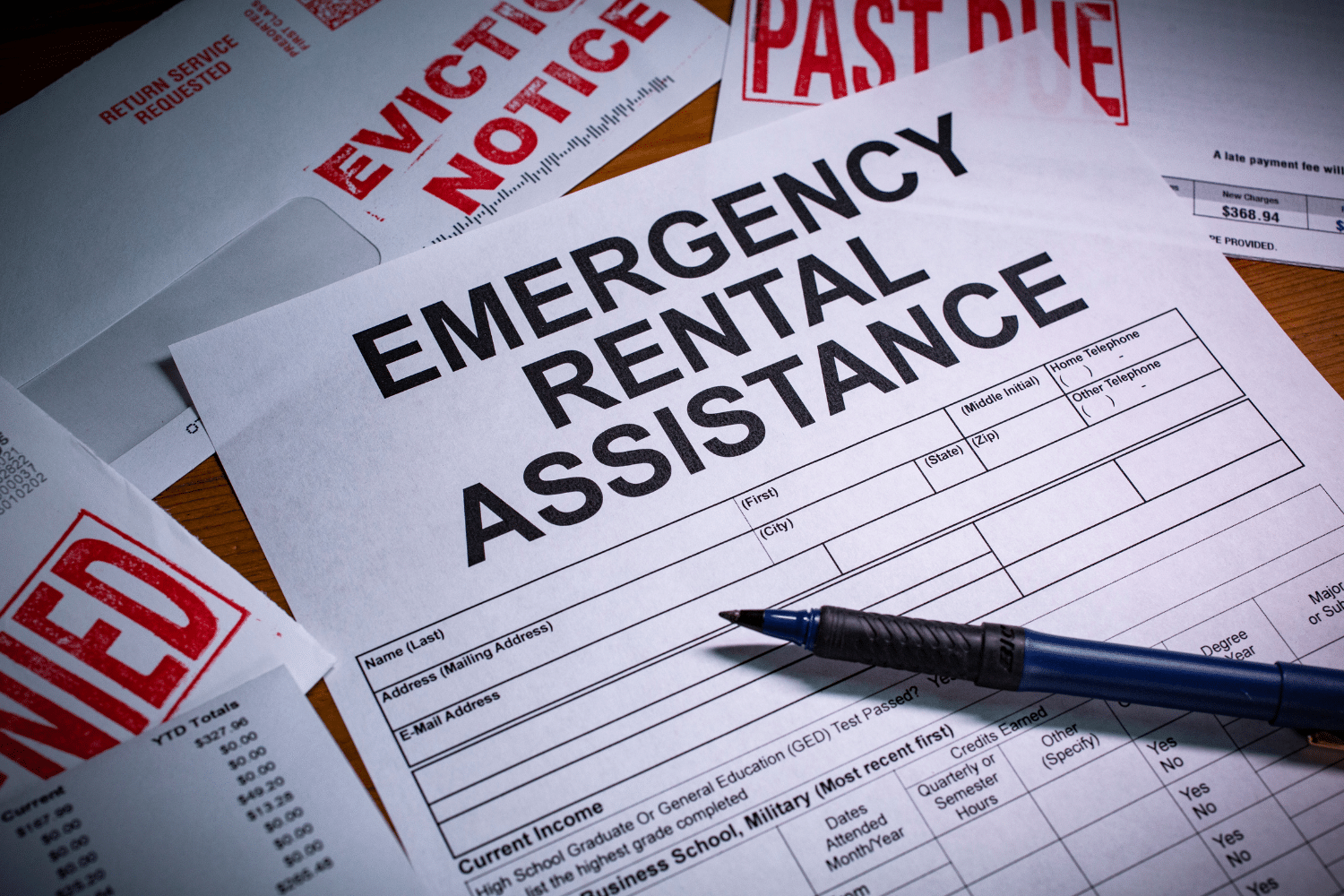Navigating aging can be tough, but numerous government programs for seniors are available to help. From financial aid and food support to housing and healthcare services, this guide outlines essential resources at the federal, state, and local levels. Find out how these programs can enhance well-being and independence for seniors.
Key Takeaways
- Various government programs for seniors focus on financial, food, housing, and energy support to enhance well-being and mitigate hardships.
- Key financial aids include Social Security benefits, Supplemental Security Income (SSI), and tax relief programs, which help cover essential living expenses.
- Food assistance programs like SNAP and CSFP, along with housing options such as HUD public housing and Section 8 vouchers, are vital for ensuring stable and nutritious living conditions for seniors.
Financial Assistance Programs for Seniors

Financial stability is crucial for well-being, but many seniors struggle with limited income and rising expenses. Assistance programs provide support in areas such as food and housing, helping to ease financial hardships. These benefits programs are available at national, state, and county levels. Platforms like BenefitsCheckUp also offer access to over 2,500 government programs specifically for seniors.
Effective navigation of these resources can enhance the support seniors receive. Understanding available options is key to maximizing benefits. Here are some specific financial assistance options available to eligible seniors: Social Security benefits, Supplemental Security Income (SSI), and tax relief programs.
Social Security Benefits
Social Security benefits serve as a reliable income source for many seniors, covering basic living expenses. These benefits are particularly vital for low-income older adults who may struggle to meet daily needs. The amount received is based on work history, supporting those who have contributed to the system.
Seniors can access Social Security retirement benefits as early as age 62, allowing flexibility in financial planning. These benefits often form the backbone of financial stability, helping cover essential costs and maintain independence.
Supplemental Security Income (SSI)
Supplemental Security Income (SSI) offers financial assistance to seniors, especially those with limited work history or insufficient income. SSI helps cover essential needs, ensuring affordability for basic necessities like food, shelter, and clothing. This program is particularly beneficial for low-income seniors not eligible for substantial Social Security benefits.
SSI eligibility is based on income, assets, and other resources. Senior citizens meeting federal poverty level criteria can receive monthly payments to ease financial burdens.
SSI acts as a vital safety net for seniors facing financial hardship, providing essential support.
Tax Relief Programs
Tax relief programs, like the IRS Elderly Tax Credit, help reduce financial burdens on eligible seniors by lowering tax obligations. This credit offsets aging-related costs, providing crucial financial aid to those in need.
Reducing tax liability helps seniors retain more income, easing financial pressure.
Food Assistance Programs for Seniors

Access to nutritious meals is crucial for seniors’ health and well-being. Many face food insecurity due to limited income and rising living costs. Food assistance programs ensure low-income seniors receive necessary nutrition, offering benefits from food stamps to home-delivered meals.
Seniors can apply for various food assistance programs to meet dietary needs, including congregate and home-delivered meals. Key programs include the Supplemental Nutrition Assistance Program (SNAP), Commodity Supplemental Food Program (CSFP), and Seniors Farmers Market Nutrition Program (SFMNP).
Supplemental Nutrition Assistance Program (SNAP)
The Supplemental Nutrition Assistance Program (SNAP) provides monthly financial assistance for low-income seniors to purchase food. SNAP benefits maintain a balanced diet, crucial for overall health. Eligible individuals include elderly and disabled with low income and limited assets.
Seniors should check SNAP eligibility, especially if SFMNP or CSFP are unavailable in their area. Participation in SNAP ensures access to nutritious meals, reducing malnutrition risk and improving quality of life.
Commodity Supplemental Food Program (CSFP)
The Commodity Supplemental Food Program (CSFP) offers monthly food packages to low-income older adults. These packages include nutrient-rich foods high in vitamins and minerals to improve seniors’ nutritional status. Eligibility requires individuals to be 60 years or older and meet income requirements.
CSFP ensures seniors access vital nutrients for health maintenance. Consistent, reliable food assistance from this program helps mitigate food insecurity effects among older adults.
Seniors Farmers Market Nutrition Program (SFMNP)
The Seniors Farmers Market Nutrition Program (SFMNP) offers eligible seniors vouchers to buy fresh, locally grown produce at farmers markets. This program supports seniors’ nutritional needs and encourages fresh fruit and vegetable consumption.
SFMNP enables seniors to enjoy fresh produce, contributing to a healthier diet and overall well-being.
Housing Assistance Programs for Seniors

Stable housing is essential, but many seniors face housing costs and instability. Government assistance programs help seniors secure affordable housing, providing peace of mind and security. These programs alleviate the financial burden of housing expenses, ensuring a safe and stable living environment for seniors.
Senior housing apartments often have waiting lists, so eligible seniors should apply early and explore multiple options.
Here are some key housing assistance programs: HUD Public Housing, Section 8 Housing Choice Vouchers, and Home Repair and Modification Programs.
HUD Public Housing
HUD public housing offers affordable housing options for low-income seniors. Housing insecurity is a significant issue, making affordable housing critical for senior well-being. Eligible low-income seniors can find affordable rental housing through HUD’s initiatives, ensuring a stable and secure living environment.
HUD public housing mitigates financial strain by offering subsidized rent and other benefits. This program promotes housing stability and improves the quality of life for low-income seniors.
Section 8 Housing Choice Vouchers
The Section 8 housing program provides rent subsidies for eligible seniors, promoting housing stability and preventing homelessness. Housing choice vouchers cover a portion of rent, keeping housing within financial reach.
This program covers the remaining rent, allowing seniors to live in safe, affordable homes. Section 8 vouchers alleviate housing cost burdens and enhance the overall well-being of low-income seniors.
Home Repair and Modification Programs
Home repair and modification programs are essential for seniors wanting to stay in their homes but needing safety and accessibility improvements. Seniors can access:
- Grants for essential repairs like roofs, plumbing, and electrical systems
- Low-interest loans for essential repairs
- Safety modifications like grab bars and ramps
These resources help ensure that seniors can maintain their independence and safety at home.
Due to high demand, seniors should apply for home repair assistance promptly to ensure they receive needed help. These programs are vital in allowing seniors to age in place, maintaining independence and quality of life.
Energy Assistance Programs for Seniors

Managing energy costs is challenging for seniors, especially on fixed incomes. Energy assistance programs alleviate utility bill burdens, ensuring comfortable living conditions without financial stress. These programs provide essential support, reducing the risk of energy-related health issues.
Numerous programs offer energy assistance benefits, including grants and emergency support. Key programs include the Low-Income Home Energy Assistance Program (LIHEAP), Weatherization Assistance Program (WAP), and Emergency Energy Assistance.
Low-Income Home Energy Assistance Program (LIHEAP)
The Low-Income Home Energy Assistance Program (LIHEAP) is a federally funded initiative providing grants to assist with energy costs. It helps low-income seniors afford necessary heating and cooling and aims to make homes more energy efficient, offering support beyond bill assistance.
Seniors can apply for energy assistance by contacting their state agency on aging, as qualifications and application processes vary by state. Participating in LIHEAP can reduce energy expenses and improve overall well-being.
Weatherization Assistance Program (WAP)
The Weatherization Assistance Program (WAP) helps families reduce energy expenses by enhancing home energy efficiency. It offers assistance to both renters and homeowners, providing services that lead to lower energy bills and increased comfort.
Improving home energy efficiency through WAP reduces energy cost burdens and contributes to sustainable living. Eligible seniors can benefit from various energy-saving improvements, making their homes comfortable and affordable.
Emergency Energy Assistance
Emergency energy assistance programs offer critical support during financial crises, helping seniors maintain utility services. These programs provide immediate relief to ensure seniors do not face dangerous living conditions due to lack of heating or cooling.
Accessing emergency assistance allows seniors to manage unexpected financial hardships and maintain well-being.
Healthcare and Medical Assistance for Seniors

It is vital for well-being, but many seniors struggle to access necessary medical services due to cost. Healthcare and medical assistance programs ensure low-income seniors receive needed care without financial worry. These programs cover services from hospital insurance to prescription medication, offering comprehensive support.
Key healthcare assistance options include Medicare, Medicaid, and Prescription Assistance Programs. These programs are crucial for helping seniors manage their health and maintain a good quality of life.
Medicare
Medicare provides essential healthcare coverage for seniors, alleviating the financial burden of medical expenses. It covers a wide range of services, including hospital and outpatient services, and prescription drug coverage through various plans. Participating in Medicare ensures seniors can access necessary medical care without fear of overwhelming costs.
Medicare is divided into parts focusing on specific aspects of healthcare: Part A covers hospital insurance, Part B covers medical insurance, and Part D covers prescription medications. This comprehensive coverage ensures seniors receive necessary medical attention, contributing to overall health and well-being.
Medicaid
Medicaid provides essential medical services, including long-term care, especially for seniors with limited income. This program ensures that low-income seniors can access necessary medical care without the financial stress that often accompanies healthcare expenses. Medicaid is particularly important for those who require in-home care services or reside in nursing homes.
Eligibility for Medicaid varies by state, with each state having its own set of criteria. Seniors who meet these requirements can receive comprehensive medical coverage, including hospital stays, doctor visits, and long-term care services.
Medicaid serves as a vital safety net for low-income seniors, ensuring they receive the care they need to maintain their health and quality of life.
Prescription Assistance Programs
State prescription assistance programs help low-income elderly residents by covering the cost of prescription medications. These programs provide comprehensive prescription drug coverage, reducing out-of-pocket expenses for seniors who may otherwise struggle to afford their medications.
Seniors eligible for these programs include those without other prescription insurance or those with Medicare Drug Plan coverage. By participating in prescription assistance programs, seniors can ensure they have access to the medications they need to manage their health conditions effectively.
Caregiver Support Programs
Caring for an elderly family members can be both rewarding and challenging. Caregiver support programs provide essential resources to help family caregivers manage their responsibilities and maintain their well-being. Organizations like AARP and the Family Caregiver Alliance offer a variety of support services, including information, respite options, and counseling tailored for caregivers.
These programs are designed to provide caregivers with the tools and support they need to care for their loved ones effectively. Let’s explore some of the key caregiver support options, including Respite Care Services and Caregiver Counseling and Training.
Respite Care Services
Respite care services offer temporary relief to family caregivers, allowing them to recharge and manage their well-being. These services can last from a few hours to several weeks, providing caregivers with the flexibility to take needed breaks. Respite care can be provided in-home or through care facilities, ensuring that seniors receive the necessary care while their caregivers rest.
By offering temporary relief, respite care services help prevent caregiver burnout and improve the overall quality of care provided to seniors. Family caregivers can use these services to maintain their health and well-being, ensuring they can continue to provide effective care for their loved ones.
Caregiver Counseling and Training
Caregiver counseling and training programs provide essential information and support to help family caregivers manage their responsibilities effectively. These programs offer guidance on accessing various support services, enabling caregivers to make informed decisions about elder care options.
By participating in counseling and training, caregivers can develop the skills and knowledge needed to provide the best possible care for their loved ones.
Employment and Volunteer Opportunities for Seniors
Staying active and engaged is crucial for seniors, as it promotes mental and physical well-being. Employment and volunteer opportunities offer seniors a chance to remain active, engaged, and socially connected, contributing to their overall quality of life. Programs available for seniors aim to enhance their engagement through work or volunteer roles, helping them overcome age bias and improve their skills.
Both employment and volunteering provide valuable opportunities for seniors to contribute to their communities and develop new skills.
Let’s explore some of the key programs available, including the Senior Community Service Employment Program (SCSEP) and various volunteer programs.
Senior Community Service Employment Program (SCSEP)
The Senior Community Service Employment Program (SCSEP) focuses on providing job training and placement assistance specifically for low-income seniors. This program helps older adults gain work experience while providing community service, linking them to local nonprofits for paid training that builds work experience. Participants typically receive around 20 hours of paid work per week along with job placement assistance.
By participating in SCSEP, low-income seniors can improve their job skills and employability, enhancing their financial stability and overall well-being. This program plays a crucial role in helping seniors remain active and engaged in their communities.
Volunteer Programs
Volunteer programs enable seniors to engage in community service while remaining socially active. Organizations like AmeriCorps Seniors offer various programs to engage seniors in meaningful volunteer work tailored to their interests. Opportunities include mentoring children, delivering meals, and providing companionship to other seniors.
Volunteering not only benefits the community but also provides seniors with a sense of purpose and connection. By participating in volunteer programs, seniors can share their skills and experiences, making a positive impact on their communities and enhancing their own well-being.
Legal Aid and Advocacy for Seniors
Navigating legal challenges can be particularly daunting for seniors. Legal aid and advocacy programs are essential in ensuring that seniors can access the justice system and protect their rights. These services include advice, representation, and assistance with legal documentation tailored for seniors. Legal aid programs for seniors are primarily administered by local or state agencies specializing in aging services.
These programs play a crucial role in addressing various legal issues that seniors may face, from housing disputes to healthcare rights. Let’s explore some key legal aid options, including Legal Aid Services and the Long-Term Care Ombudsman.
Legal Aid Services
Seniors can access various legal aid services that include assistance with document preparation and legal representation through local agencies. These services not only help seniors navigate legal challenges but also enhance their overall well-being and security.
By ensuring that seniors have access to justice, legal aid services protect their rights and provide peace of mind.
Long-Term Care Ombudsman
The long-term care ombudsman is responsible for investigating and resolving complaints regarding care quality in long-term care facilities. Acting as advocates, the ombudsman’s office assists seniors and their families with complaints and interactions with government agencies.
This role is crucial in ensuring that seniors receive the appropriate care and services they are entitled to by law.
Summary
In summary, there are a multitude of assistance programs available to support seniors in various aspects of their lives. From financial and food assistance to housing, energy, healthcare, and beyond, these programs play a crucial role in ensuring that older adults can live with dignity and security. By taking advantage of these resources, seniors can alleviate financial burdens, access necessary healthcare, and maintain a good quality of life.
It is essential for seniors and their caregivers to explore these options and apply for the programs they are eligible for. The support provided by these programs can make a significant difference in the lives of seniors, helping them navigate the challenges of aging with confidence and peace of mind.
Frequently Asked Questions
Key financial assistance programs for seniors include Social Security Benefits, Supplemental Security Income (SSI), and various Tax Relief Programs, which help ensure financial stability and support during retirement. These resources are essential for maintaining quality of life in later years.
Seniors can easily apply for the Supplemental Nutrition Assistance Program (SNAP) by verifying their eligibility and reaching out to their local SNAP office or state agency on aging for assistance.
Low-income seniors can access housing assistance through options like HUD Public Housing, Section 8 Housing Choice Vouchers, and Home Repair and Modification Programs. These programs are designed to improve housing affordability and living conditions for seniors in need.
LIHEAP assists seniors by providing grants to help cover energy costs, such as heating and cooling bills, thereby enhancing home energy efficiency and supporting their financial stability.
Family caregivers of seniors can access Respite Care Services for temporary relief, as well as Caregiver Counseling and Training programs that offer vital information and support to help them in their role.








